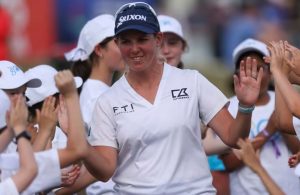- Molly O’Callaghan, a 19-year-old swimmer from Australia, etched her name in the annals of swimming history with a remarkable performance in the Women’s 200m Freestyle event
- Akshay Bhatia, 21, Wins his First PGA Tour Title at the Barracuda Championship
- Bruno Fernandes Replaces Harry Maguire as New Man Utd Captain
- Lionel Messi Surprises Teammate in group chat ahead of Grand Unveiling
- Man Utd Sign Keeper Andre Onana from Inter
The wait for Ryder Cup week is over – Bring it on’
- Updated: September 21, 2021
- 724
 BBC Sport
BBC Sport
Ryder Cup: US v Europe at Whistling Straits – the wait is over
Grandstands soared into Parisian skies, so high from the back row the Eiffel Tower was visible 15 miles away. They created a most intimidating first tee environment the last time the Ryder Cup was played.
This week a more compact structure surrounds the opening teeing ground, but it will be no less frightening for the 24 players on duty, when Europe defend golf’s most famous pot of gold against the United States.
There is no more scary shot than an opening drive at a Ryder Cup. It is the moment the true extent of the event envelopes players, leaving them shaking with nerves.
Rory McIlroy regarded the usually biennial match as some sort of exhibition until he teed it up for his debut at Celtic Manor in 2010. And back then the grandstand was significantly smaller than at Le Golf National in 2018 and, indeed, Whistling Straits this week.
“I got to the first tee and I realised the magnitude of it all,” the Northern Irishman later admitted. “It just hits you.
“You try and put your ball on that tee and it takes you a couple times to get it to settle on there.”
Standing on that first tee here in Wisconsin, while Europe’s players prepared to land at Milwaukee airport, there was not a soul occupying the surrounding 3,500 uniform grey seats.
But as I looked around it was easy to imagine the extraordinary din that will be generated come Friday morning. The chants will be as passionate as they are unimaginative – “U-S-A, U-S-A”.
European “Oles” will be few and far between.
Those American roars will reflect the home side’s desperation to win back a trophy that has been returned to European hands seven times in the last nine matches and in nine of the last 12.
The United States made the most of home advantage at Valhalla in 2008 and Hazeltine in 2016, the only occasions they have won the Ryder Cup this century.
Covid travel restrictions mean they will do so this time with nigh on unanimous home support.
It was a similar scenario a fortnight ago when Europe’s women silenced US fans with an epic 15-13 win in the Solheim Cup at the Inverness Club near Toledo, Ohio.
That success now offers an inspiring template for Padraig Harrington’s team.
Like Catriona Matthew’s side, Europe’s men are substantially lower in the world standings. With an average rank of 8.9, this is America’s strongest Ryder Cup team since the rankings were first introduced in 1986.
Europe, who boast world number one Jon Rahm are on average, 20 places lower in the standings, but have frequently made a mockery of such discrepancies. Their traditional team bond often renders them greater than the sum of their parts.
That needs to be the case again if they are to cling onto the trophy they so comfortably won in France in 2018. Initial portents are encouraging, judging by Brooks Koepka’s comments on how the Ryder Cup messes with his usual routine.
“It’s tough,” he told Golf Digest. “There are times where I’m like, I won my match. I did my job. What do you want from me?
“I know how to take responsibility for the shots I hit every week. Now, somebody else hit a bad shot and left me in a bad spot, and I know this hole is a loss.”
It is impossible to imagine a European player making any statement that could be construed as calling into question commitment to the cause.
Compare McIlroy’s recent comments while struggling to remember his individual Ryder Cup record, or those of record points scorer Sergio Garcia. For them the only priority is the team reaching 14 or 14½ points; they would be happy if that goal is accomplished, regardless of whether they lost all five of their own matches.
But this is an opportunity for America to reframe their Ryder Cup narrative. They have six rookies in their least experienced team since 1997.
As was the case when they won in 2008, half of their team bear no scar tissue accumulated from so many defeats in the last dozen matches.
The likes of Open winner Collin Morikawa, player of the year Patrick Cantlay and Olympic champion Xander Schauffele are unburdened by past defeats. They are rookies but also seasoned winners.
They present a genuine threat to European hopes.
By contrast the visitors, while not last of the summer wine, are of a seasoned vintage. Lee Westwood, 48, and with his 20-year-old son Sam on the bag, equals Sir Nick Faldo’s record of 11 European appearances.
Wildcard pick Ian Poulter is 45, Paul Casey 44 and Garcia 41. All remain fit and strong but Whistling Straits is a huge golf course and a demanding walk and they will need careful management by the skipper and his vice captains.
Garcia’s record haul of 25½ points matches the total of the American team combined, while Westwood would tie Billy Casper’s record of appearing on eight winning teams if Europe prevail.
This is the fourth decade that both players are appearing in the Ryder Cup. Their names and games run through the DNA of so much of the glory enjoyed by their continent’s golf fans.
World number 14 Viktor Hovland, at 23 and the first Norwegian to represent Europe, is the baby of the team but already a world class talent. Along with Rahm and McIlroy he possesses firepower to match the big-hitting Americans.
Indeed, the two teams are well matched in terms of distance. Poulter is at the shorter end of the spectrum, but any deficiency there can be cancelled by his excellent approach play when paired with a big hitter in foursomes.
The Englishman’s putting is another crucial quality and on likely lightening fast greens that may be the area where the US will hold an advantage. Europe also need the likes of Tyrrell Hatton and Matt Fitzpatrick to quickly rediscover form.
Their best chance is to tap into Europe’s extraordinary spirit. Remember how Westwood was dragged out of the doldrums back in 2002 when the continent won at the Belfry.
That was the last time we had to wait three years for a Ryder Cup. At long, long last the 2020 event has arrived and expectancy levels here in Wisconsin could not be higher.
Come Friday it is fair to anticipate heightened decibel levels, especially around that first tee. The atmosphere will inspire and it could intimidate; who copes best will win.
Bring it on.
Source : BBC Sport
By Iain Carter BBC golf correspondent


















